Education & Training
One of the main objectives of StoRIES is to create and empower a new generation of researchers and technologists with holistic competencies encompassing:
-
technical,
-
environmental,
-
economic and
-
social aspects
of energy storage technologies, systems and hybridisation, and to foster knowledge exchange between academia and industry through courses and training for existing and future workforce.
StoRIES education and training opportunities are open to all those interested in hybrid energy storage.
If you need more information about StoRIES education and training programmes, please contact Pınar Arpaçay (KIT).
The following actions will be targeted:
Training programme for university master’s students
StoRIES early-stage researcher network
Mentoring programme for PhD students dealing with energy storage
Summer schools for early-stage researchers
Online courses for workforce from academia and industry
Online platform with existing online open academic courses on energy storage
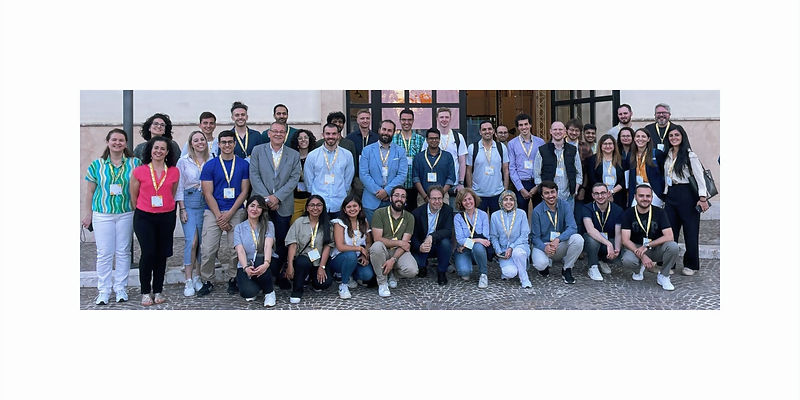
![Graphic 1 [Recovered]-08.png](https://static.wixstatic.com/media/7f75db_2eca70c361bd4e4bb64f71c574dbe541~mv2.png/v1/fill/w_66,h_73,al_c,q_85,usm_0.66_1.00_0.01,enc_avif,quality_auto/Graphic%201%20%5BRecovered%5D-08.png)
Training Programme For University Master’s Students
The Master Student Training Programme will provide the opportunity for the students working on energy storage DURING THE THESIS PERIOD to get additional knowledge and skills necessary for the understanding of the hybrid energy storage and its influence on its technical, economic, social and environmental surrounding.
Training Programme is not required to be formally recognized by the Universities. It is based on a mentorship model over a voluntary basis. Involved Universities are invited to mentor the students, attending the Programme. Mentors monitor and assess the achievement of training objectives by the students, and on local coordinators who trace the outcomes of students' activity at each University. No degree title is delivered.
Students have to be involved over a specific Challenging Scientific and Technological Topic in the field of:
-
Development of new materials for energy storage devices
-
Hybridization in the energy storage field at the materials level
-
Hybridization in the energy storage field at the component/device level
-
Innovative Energy carriers and related technologies for production/utilization
-
Energy Storage Integration in multi-energy eco-systems
-
Sustainability of the hybrid energy storage solutions
2023 Seminars
Prof. Andrea Balducci - Supercapacitors: state-of-the-art, application and future perspective
Titichai Navessin - Accelerated Materials design and industrial scale up for H2 Technologies
Dominic Bresser - Fundamentals, State of the Art, and Anticipated Developments in Lithium-ion Batteries
Stefano Passerini- Sodium and other post-lithium batteries, Fundamentals, state of the art and anticipated further developments
2024 Seminars
The Training Objective consists in the achievement, over a specific topic, of a knowledge including the following components:
-
Technical: mentored research investigation on a Challenging topic (it can include working experience at the infrastructure of RI providers within StoRIES)
-
Interdisciplinary and multi-level approach: the student follows a multidisciplinary approach as needed by a challenge-driven study, understanding the multi-level (from materials-to component and systems) aspects of systems solutions developed
-
Environmental: the students are trained toward sustainable solutions and to assess environmental benefits provided by the implementation of developed solutions
-
Economic: the student during the training is trained to consider the economic aspects in the solutions development since a viable business model is needed for their implementation
-
Social: the student is trained to consider social acceptance aspects in the solutions development and/or social impact of the developed solutions
For more information please contact Linda Barelli
The presentations are also available. You can view them here for:
Antonio Morandi - Magnetic energy storage: state-of-the-art, application and future perspectives
Massimo Guarneri - Open batteries: state-of-the-art, application and future perspectives
Giovanna Cavazzini - The mechanical storage: state-of-the art, applications and future perspectives
Luisa F. Cabeza - Thermal Energy Storage (TES) materials: state-of-the-art, application and future perspectives on materials used for TES and related technologies
2025 Seminars
Giacomo Gorni - The Role of Energy Storage with Renewable Electricity Generation
Marcel Weil - Sustainability aspects of energy storage solutions
Anina Irene De Luca - Sustainability aspects of energy storage solutions with particular focus on Social implication
Massimo Santarelli - Hydrogen and other energy carriers: production and application in the power to X framework
Jens F, Peters - The mechanical storage: state-of-the art, applications and future perspectives
Gaetano Zizzo - Energy storage systems integration in electric power systems. Regulation, dimensioning, use cases
2
2
![Graphic 1 [Recovered]-08.png](https://static.wixstatic.com/media/7f75db_2eca70c361bd4e4bb64f71c574dbe541~mv2.png/v1/fill/w_66,h_73,al_c,q_85,usm_0.66_1.00_0.01,enc_avif,quality_auto/Graphic%201%20%5BRecovered%5D-08.png)
StoRIES Early-stage Researcher Network
Key Achievements and Impacts of the Programme
Programme Leaders: Hüseyin Ersoy (KIT) and Pınar Arpaçay (KIT)
StoRIES is dedicated not only to advancing hybrid energy storage, but also to supporting a new generation of scientists and engineers who will drive this progress in the coming years.
-
A network of 46 early-stage researchers representing 34 organisations across Europe has been established, encouraging collaboration.
-
8 PhD students were selected for the StoRIES Mentoring Programme, with priority given to members of the researcher network.
-
All network participants had priority access to StoRIES Summer Schools, which provided advanced training, interdisciplinary knowledge exchange, and international cooperation opportunities.
This effective initiative was not part of the original grant agreement. It demonstrates a proactive effort to strengthen skills and ensure the long-term development of expertise in energy storage.
Objective
Energy storage research is one of the key elements for realizing a sustainable energy transition where young generation energy researchers will act as a driving force. In this manner, StoRIES project addresses the required future research directions and promotes a strong transdisciplinary research cooperation within the created storage eco-system. Hence, the aim of the network is to provide opportunities for early-stage researchers in the field of energy storage to benefit from the fund of scientific knowledge and improve their skills under the supervision of leading scientists and engineers.
The StoRIES Early-stage Researcher Network is open to scientists and engineers (Bachelor, Master, PhD students and PostDocs within 2 years after their PhD), including those outside the StoRIES consortium (from H2020 countries). The network's researchers are given priority in the mentoring programme and summer schools. They are also actively informed about conferences dealing with hybrid energy storage, invited to present their work to the StoRIES community for improving the quality and involved in the revision of the project publications.
Procedure
To join the network, please send Hüseyin Ersoy (KIT) a motivation letter (no longer than 1.5 pages) in which you briefly describe:
-
your research topic and how your approach will contribute to solving existing and potential challenges of energy storage
-
other technologies and/or aspects of energy storage in which you are interested and which could make an important contribution to the development of future energy storage solutions
Researchers in the Network
The list of the researchers affiliated to the StoRIES Early-stage Researcher Network in alphabetical order can be seen here.
If you need more information about the StoRIES Early-stage Researcher Network, please contact Hüseyin Ersoy (KIT) and Pınar Arpaçay (KIT).
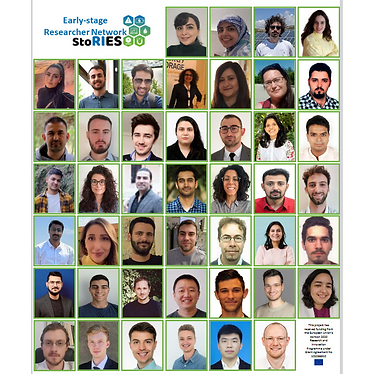_edited_edited.png)
Mentoring Programme For PhD Students
Dealing With Energy Storage
![Graphic 1 [Recovered]-08.png](https://static.wixstatic.com/media/7f75db_2eca70c361bd4e4bb64f71c574dbe541~mv2.png/v1/fill/w_66,h_73,al_c,q_85,usm_0.66_1.00_0.01,enc_avif,quality_auto/Graphic%201%20%5BRecovered%5D-08.png)
3
Key Achievements and Impacts of the Programme
Programme Leader: Pınar Arpaçay (KIT)
StoRIES Mentoring Programme brought together doctoral students and leading senior experts to support PhD students’ research and professional development in the field of energy storage.
-
8 mentor-mentee pairs were established, involving participants from 15 organisations across Europe.
-
50% gender balance was achieved.
-
5 in-person visits were conducted, in addition to regular online meetings.
The programme also enhanced students’ soft skills and interdisciplinary thinking, while providing opportunities for networking.
Objective
Through the Mentor-Mentee Pair Programme, StoRIES offers PhD students the support of excellent senior scientists and engineers. In the programme, PhD students will be mentees under the guidance and supervision of senior research mentors from academia or industry. The mentor must be external, not the student’s official PhD supervisor from their own organization. StoRIES believes that successful thesis activities, which prepare students for their future work, should include opportunities for networking and developing soft skills, as well as gaining knowledge on topics not directly related to the thesis. PhD students working on energy storage technologies will have a great opportunity to meet with expert mentors to discuss their work and its impact, and take a broader perspective.
Procedure
1. If you would like to become one of the StoRIES mentors, please apply by contacting Pınar Arpaçay (KIT) by email.
2. The mentor (PhD supervisor) is asked to submit a short CV, while the mentee (PhD student) submits a CV and thesis description. As the mentor must agree to the mentee's participation in the programme, his/her email address should be included in the application email.
3. The application will be assessed within one month, after the application email. Mentor-mentee pairs must be accepted by the Education Programme Management Committee (EPMC) of StoRIES.
Implementation
The collaboration between the mentor and mentee established under the StoRIES programme should include the following:
-
Regular online meetings, scheduled at intervals agreed upon by both parties (e.g., every 4, 6, or 8 weeks), will be held to discuss the PhD work, progress, challenges, and plans for the coming months.
-
A face-to-face meeting can be arranged upon request, ideally in a location of mutual interest for both the mentor and mentee. This could be, for example, the research organization of the mentor or mentee. However, it is highly recommended that this meeting can take place during the Third StoRIES Summer School, scheduled for summer 2025.
-
Either the mentee or the mentor will apply for the reimbursement to attend the face-to-face meeting and StoRIES will cover the costs of travel, accommodation and daily expenses for a stay up to 3 nights. Please note that StoRIES will not cover the costs of both parties. The application for reimbursement must be done by either the doctoral candidate or the mentor before the trip. Please contact Pınar Arpaçay (KIT) to receive the confirmation that your expenses will be covered before travelling. Depending on the decision of EPMC, a confirmation of reimbursement will be sent, or a refusal will be justified. The budget rules for reimbursement will be shared before the trip. The last request for reimbursement will be accepted by the end of July 2025.
-
In order to receive financial support, the report on the mentoring programme must be submitted after the mentor's or mentee's travel, together with all relevant travel invoices for expenses. The report must include information about the dissertation, the added value of the programme, and a communication flow (meetings) to be confirmed by both parties. The report template can be downloaded here. After completing the report together, the mentee must ensure that the mentor is in carbon copy (cc) when sending the report to Pınar Arpaçay (KIT). The report will be published on the StoRIES website.
-
The collaboration between the mentor and the mentee must end automatically with the end of the PhD study or with the end of the StoRIES project (31/10/2025). Even if the formal collaboration and support ends with the StoRIES project, the mentor and mentee are encouraged to continue their collaboration as they see fit.
Potential Collaboration Ideas
The mentor and mentee jointly make the final decision on the content of the collaboration, considering the program's objective. Here are some potential collaboration ideas for the program, including but not limited to the following:
-
The mentor leads the mentee in their area of expertise.
-
Collaborate/support on writing a research paper.
-
Utilize the facilities at the mentor's organization to help the mentee acquire new skills.
-
By regularly attending the mentor’s online group meetings, the mentee can develop soft skills for effective communication and teamwork, and expand their professional network. These meetings also encourage idea exchange, fostering creativity and collaboration. Additionally, the mentee can practice presentations, enhancing public speaking skills and understanding of scientific concepts.
-
Working together to write a proposal for potential future research funding opportunities enables the mentee to develop their writing skills during the PhD and can create opportunities for their future career.
These collaborative efforts can significantly enrich the mentee's PhD experience and contribute to their professional development.
Mentoring Programme Reports
Sai G. Patnaik & Mayank Joshi: Sustainable materials for sodium-based battery
Stefano Passerini & Hüseyin Ersoy: Implementation of constructive sustainability assessment framework for an emerging energy storage technology
Esther Rojas Bravo & Elham Abohamzeh: Development of a sorption heat storage system for seasonal energy storage in buildings
Manuel Baumann & Irena Beloreshka (Report II): Research into and development of economic models for deployment of electricity storage systems
Mentor-Mentee Pairs
In March 2023, StoRIES' first mentor-mentee pair began their collaboration. Stefano Passerini, senior expert advisor at Austrian Institute of Technology (AIT) and senior professor at Karlsruhe Institute of Technology (KIT), will support Hüseyin Ersoy from KIT with his expertise in the PhD thesis entitled ‘Application of constructive sustainability assessment (CSA) for emerging energy storage technologies’. The central question of the dissertation project is to identify how can CSA approach be used to develop a sustainable and economically feasible Al-air battery for seasonal energy storage, while minimizing negative impacts and identifying opportunities for improvement through informed decision-making. To this aim, the dissertation aims evaluation of life cycle sustainability assessment (LCSA) methodologies, and provide a full application case that will act as a blueprint for full assessment of an emerging energy storage technologies. The cumulative dissertation will be carried out with 3 papers concerning methodology review and evaluation, a full LCSA of an emerging Al-air battery, and a conclusive research article about the impact of integrating sustainable thinking in early design phases.
StoRIES introduced its second mentor-mentee pair in Mentoring Programme in January 2024. Researcher Manuel Baumann from Institute for Technology Assessment and Systems Analysis (ITAS) in KIT will support Irena Beloreshka from Faculty of Management in Technical University of Sofia in her PhD project with the title of ‘Research into and development of economic models for the construction of battery-based electricity storage systems’. The main objective of the work is hybrid projects involving a renewable generation asset and battery-based energy storage system in Bulgaria. The project is aimed to assess the business case, funding gap, and identify possible additional revenue streams for the storage array. The case of a standalone battery energy storage systems (BESS) to provide energy-storage-as-a-service in Bulgaria will also be explored as well as a suitable tariff structure and calculation. The research considers various technical options and configurations with reviewing regulatory frameworks, proposing measures to address any gaps identified.
In September 2024, StoRIES welcomed the third mentor-mentee pair collaboration between senior researcher Giovanni Battista Appetecchi from ENEA (Italian National Agency for New Technologies, Energy and the Sustainable Economic Development) and PhD student Luigi Jacopo Santa Maria from JLU Gießen. Appetecchi will support Santa Maria in his PhD project entitled ‘Microstructure effects in sodium-based composites for all-solid-state batteries’. The doctorate project focuses on the development and validation of electro-chemo-mechanical microstructure-resolved models and simulation for sodium solid-state batteries (Na SSB). Furthermore, the PhD work will focus on developing electrode design proposals with a special focus on their performances. This study is a part of the HiPoBat project, a German-French research project dedicated to batteries for high power applications.
StoRIES continued to grow with the fourth mentor-mentee pair in September 2024. Linda Barelli from the University of Perugia will support Monica Giovannucci from the University of Bologna in her PhD thesis entitled ‘Use of green supercapacitors to improve redox flow battery performance: testing and modelling’. The doctorate research aims to develop hybrid storage systems combining Redox Flow Batteries (RFBs) and Supercapacitors (SCs). Initially supported by the HyFlow European project, the work focuses on creating a hybrid energy storage system (HESS) that exploits the high specific power of SCs and the large storage capacity of Vanadium RFBs. The project also explores eco-friendly electrolytes for SCs. Furthermore, the research includes testing a lab-scale Vanadium Redox Flow Cell connected directly to SCs, forming a HESS without power converters. A MATLAB model was used to analyze current flow and optimize system capacitance. Preliminary results are promising, and the next steps involve economic evaluation and expanding to other battery types and HESS applications.
StoRIES expanded in October 2024 with the addition of the fifth mentor-mentee pair. Sai Gourang Patnaik, a researcher from the Interuniversity Microelectronics Centre (IMEC), will mentor PhD student Mayank Joshi from Politecnico di Torino and CNR-ITAE Messina on his PhD project entitled ‘Exploring Na-ion battery electrode materials through electrospinning utilizing organic materials’. The PhD project focuses on developing environmentally friendly and sustainable materials for sodium-based energy storage technologies, including sodium-ion and sodium-air batteries. In order to improve energy storage performance, it aims to create organic anode materials that can function as self-standing electrodes without requiring a binder. The research also includes the investigation of hybrid (organic/inorganic) and organic electrocatalysts derived from biomass conversion and organic polymers for use in sodium-ion, sodium-air and redox flow batteries. The project, funded by CNR ITAE, aims to accelerate the development of innovative, sustainable materials. These materials will be tested in full battery cells to evaluate their charge/discharge efficiency and capacity retention, advancing sodium-based technologies as a safer and more cost-effective alternative to lithium-ion batteries.
In October 2024, the StoRIES Mentoring Programme brought together its sixth mentor and mentee. John Irvine from the University of St. Andrews will support PhD student Deepa Davison from the University Carlos Ⅲ of Madrid (UC3M) and Iberian Energy Storage Research Center (CIIAE) on her doctorate project entitled ‘Synthesis and processing technologies for reversible proton conducting ceramic cells (r-PCC)’. This PhD project aims to drive innovation in the development of cost-effective, energy-efficient reversible r-PCCs, with a focus on both electrode-supported and metal-supported designs. The research will explore the formulation of advanced proton-conducting ceramics with high conductivity, as well as an appropriate thermo-chemical & thermo-mechanical stability and sufficient catalytic activity. In addition to material development, the project will focus on optimizing manufacturing techniques such as Powder Extrusion Moulding, Powder Injection Moulding, and Tape-casting of Oil/Water emulsion for the fabrication of optimized ceramic/metallic supports. This research aligns closely with the objectives of the European-funded ALCHEMHY project, which is investigating the use of renewable hydrogen as a feedstock in innovative production routes, contributing to EU's climate-neutrality objectives.
In December 2024, StoRIES established the seventh mentor-mentee collaboration. Senior researcher María Esther Rojas Bravo from CIEMAT (Centro de Investigaciones Energéticas, Medioambientales y Tecnológicas) will support Elham Abohamzeh from Saarland University in her PhD project entitled ‘Development of a sorption heat storage system for seasonal energy storage in buildings’. The PhD project focuses on the development of a closed sorption heat storage system aimed at enhancing energy efficiency in residential buildings. The research integrates experimental studies on a developed prototype with advanced computational modeling to predict and optimize the storage system performance. Part of this work involves refining existing Computational fluid dynamics (CFD) simulation methodologies, providing more accurate models for analyzing the coupled reactions and heat and mass transfer processes within the system. The results from experiments and CFD simulations are used for optimization of the developed prototype. Additionally, the study incorporates a planned co-simulation framework that combines the CFD solver with a Simulink-based building energy model. This innovative approach enables comprehensive annual performance analyses, offering detailed insights into the optimized system potential for integration into residential energy infrastructures.
In February 2025, StoRIES welcomed the eight mentor-mentee pair collaboration between Giovanna Cavazzini from University of Padova and PhD student Carla Larissa Fonseca da Silva from the University of Lisbon. Cavazzini will support Silva in her PhD project entitled ‘Climate change: impacts on extreme hydrological phenomena in Portugal’. Climate change is expected to result in increased frequency and magnitude of extreme hydrological events (e.g., droughts and floods) and exacerbate their respective impacts. Regions such as Continental Portugal, characterized by pronounced hydrological irregularity, are particularly sensitive to these phenomena. Therefore, the project aims to assess the effects of climate change in Portugal by studying the behavior of extreme precipitation, analyzing the performance of regional models of short-duration precipitation, and studying floods under climate scenarios, as a way of contributing to the management of surface water resources. The project will utilize statistical analysis to identify trends, Intensity-Duration-Frequency (IDF) curves to validate regional models, and machine learning algorithms for flood analysis under climate scenarios. It is anticipated that this project will contribute to decision-making regarding climate change.
If you need more information or would like to become one of the StoRIES mentors, please contact Pınar Arpaçay (KIT).
3
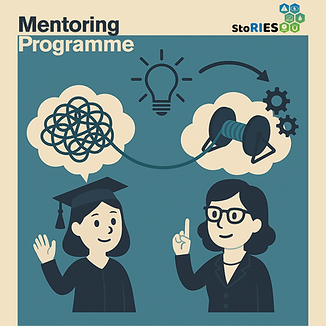
Summer Schools For Early-Stage Researchers
![Graphic 1 [Recovered]-08.png](https://static.wixstatic.com/media/7f75db_2eca70c361bd4e4bb64f71c574dbe541~mv2.png/v1/fill/w_66,h_73,al_c,q_85,usm_0.66_1.00_0.01,enc_avif,quality_auto/Graphic%201%20%5BRecovered%5D-08.png)
4
Key Achievements and Impacts of the Programme
Programme Leader: Pınar Arpaçay (KIT)
StoRIES Summer Schools have made notable progress in the areas of training early-stage researchers, supporting research collaboration, and promoting equality and diversity in science and technology.
-
Three international summer schools were successfully organised with the participation of a total of 101 early-stage researchers. This achieved the project's Key Performance Indicator (MO5 - KPI 5.3).
-
26 lectures were delivered on energy storage and hybridisation.
-
The third summer school, held in conjunction with the eight StoRIES project meeting, attracted approximately 100 participants, making it the largest StoRIES event to date.
-
Gender balance in STEM was actively promoted. Nearly half (24 students) of the 50 researchers in the third summer school were women. 4 out of the 8 invited speakers were also women.
-
The programme not only educated young scientists and engineers, but also actively invested in their future and ensured that their voices were heard in shaping the energy transition. The best working group from the second summer school developed a case study focused on hard-to-abate sectors and contributed to the development of the Hybrid Energy Storage Roadmap. Meanwhile, the best working group from the third summer school was invited to present their group work at the StoRIES Final Conference, which will take place in Brussels from 7 to 9 October 2025.
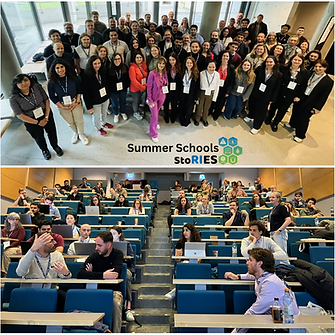
Third StoRIES Summer School 2025
The Third StoRIES Summer School 2025, entitled "Mid- to Long-term Hybrid Energy Storage" will take place from June 10 to 12, 2025, in Trondheim, Norway, co-hosted by SINTEF and NTNU (Norwegian University of Science and Technology).
Important Updates:
Working Groups for Case Studies
If you need more information, please contact Pınar Arpaçay (KIT).
CLOSED
Conditions and Application Process:
We warmly welcome early-stage researchers to apply, including:
-
Master’s students
-
Master of Science (within 5 years after graduation)
-
PhD students
-
Postdoctoral researchers (within two years of completing their PhD)
Registration & Costs:
There is no registration fee for accepted participants. The summer school will provide free access to all summer school sessions, including coffee breaks, lunch, dinner, and social events as part of the official programme. However, accommodation, visa, travel, and other personal expenses are not covered, and participants are responsible for making their own arrangements.
Application Process:
To apply, candidates must fill out and submit the application form by 21 March 2025. Acceptance confirmation emails will be sent in the last week of March.
Next Steps After Acceptance:
-
Plan your travel & accommodation: Once confirmed, book your trip to Trondheim and arrange your stay. Affordable accommodation is available at €40 per night (Rumi Hostel).
-
Prepare your poster: The EERA Joint Programme on Energy Storage (JP ES) Poster Award will be granted to the best poster:
🥇 1st place: €250
🥈 2nd place: €150
🥉 3rd place: €100
Winners will receive a certificate + monetary prize.
Certificate of Attendance
All participants will receive a certificate after the summer school indicating the topics covered and the expected number of hours completed.
The main objective of the joint StoRIES - NordicRFB Summer School is to give a new perspective on the integration of various energy storage solutions to address the challenges and opportunities in the pursuit of a successful energy transition. Several case studies revealing different combinations of energy storage technologies to provide the best performance in terms of capacity and duration, while also offering the desired flexibility, economic and environmental viability, setting the stage for developing hybrid energy storage will be presented during the Summer School.
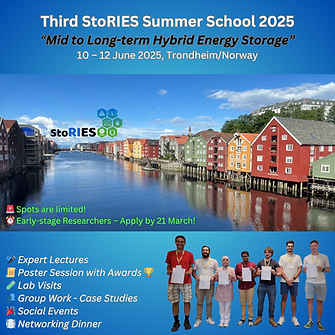
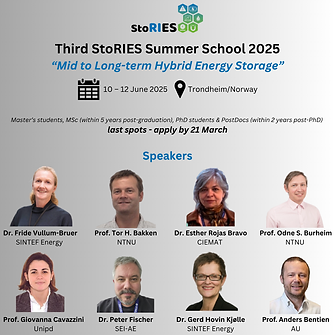
The StoRIES Summer School 2025 lectures are available to watch online here.
Peter Fischer - General aspects of relevant applications for HES
Anders Bentien - Future needs & technologies for stationary storage of electric
Fride Vullum-Bruer - Hybrid thermal & electrochemical ES in buildings
Tor Bakken - The role of hydropower in balancing a renewable energy system with a large share of intermittent power sources
Giovanna Cavazzini - Pumped-hydropower plants & its hybridisation
Gerd Kjølle - A flexible & intelligent power grid for the energy transition
Odne Burheim - Hydrogen – electrolysis & what’s next
Second StoRIES Summer School 2024
The Second StoRIES Summer School 2024 entitled "Hybrid energy storage and application-oriented solutions in EU" will be held in Rome in Italy (Complesso Eni Gazometro di Roma, Via Ostiense 72, 00154 Roma) between 3 June and 6 June 2024.
The main objective of the Summer School is not only to provide a general overview of a combination of various energy storage technologies (electrochemical, chemical, thermal, electrical and mechanical energy storage), but to suggest innovative hybrid solutions at different levels (from industrial-, to grid-, microgrid-, and domestic-scale applications) for early-stage researchers (MSc, PhD students and postdoctoral researchers within 2 years after PhD). Well-recognised experts will share insights on the issues related to hybrid energy storage applications.
Please note there is no registration fee for the summer school. Registration includes access to all summer school sessions, coffee breaks, lunch and dinner free of charge as part of the program. Please also note that accommodation, visa, travel costs and any other expenses are not covered. Participants are responsible for making their own arrangements in this regard.
The deadline for the application is 31 March 2024. Important Updates regarding Summer School 2024 can be seen below:
Working groups information for the case studies
For more information, please contact Pınar Arpaçay (KIT).
CLOSED
The StoRIES Summer School 2024 lectures are available to watch online here.
Peter Fischer - Hybridisation of vanadium flow batteries
Linda Barelli - Flywheel-battery HESS integration in smart buildings
Ing. Davide Aloisio - Hybrid systems in Off-grid and Energy Islands
Massimo Santarelli - Hybrid hydrogen-battery storage systems for communities
Davide de Michino - Vehicle Grid Integration Technologies
Francesco Mastopierro - Electric energy storage for future aero mobility
Randell Johnson - Hybrid Renewables with Storage Technology Stack for Valuation, Planning, Design
Maria Carmen Falvo and Lorenzo Romagnoli - Integration of Energy Storage in Transmission & Distribution Grids: why, where and how?
Asmae Berrada - Hybrid Energy Storage for Renewable Energy Sources Integration in Industrial Grid
Giancomo Gorni - The role of Energy Storage with Renewable Electricity Generation
First StoRIES Summer School 2023
To enable early-stage researchers (Master, PhD students
and PostDoc within 2 years after their PhD) to gain
knowledge on various aspects of hybrid energy storage
and its integration into energy systems, StoRIES will
organise three summer schools for early-stage scientists
starting in 2023. Participants of the summer schools are
students from StoRIES consortium and external
organisations.
The first StoRIES Summer School entitled "REPowerEU
and the need for energy storage in Europe" will be held
at the Cyprus Institute in Nicosia from 29 May to 1 June
2023. The main objective of the Summer School is to
provide and exchange knowledge on the importance of
energy storage in Europe. Experts will share insights on
the issues related to energy storage, including needs.
existing and future technologies, hybridisation.
sustainability, legal issues and economic parameters.
Registration for the Summer School will open in January
2023.
Important updates:
CLOSED
Video: Renewable Hydrogen costs and end uses: A case study for Cyprus - Nestor Fylaktos
The StoRIES Summer School 2023 courses are available online! You can watch them here.
Manuel Baumann - Sustainability perspective on energy storage: technology, methods, challenges, prospects
Linda Barelli - Available Energy Storage technologies and their applications
Laura Meda - Eni's vision for storage in the Energy Transition
Stefano Passerini - What is StoRIES?
Kourosh Malek - Novel approaches in meta-data management and ontologies
Ivan Matejak - European and global green strategy | State of Play
Online Courses For Workforce From Academia And Industry
![Graphic 1 [Recovered]-08.png](https://static.wixstatic.com/media/7f75db_2eca70c361bd4e4bb64f71c574dbe541~mv2.png/v1/fill/w_66,h_73,al_c,q_85,usm_0.66_1.00_0.01,enc_avif,quality_auto/Graphic%201%20%5BRecovered%5D-08.png)
5
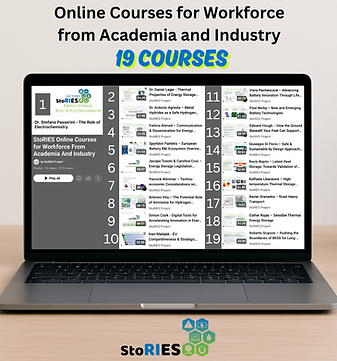
Key Achievements and Impacts of the Programme
Programme Leader: Pınar Arpaçay (KIT)
The programme offerred a series of courses designed to provide professionals from academia and industry with interdisciplinary knowledge to understand, apply and innovate complex energy systems.
-
19 expert-led courses were successfully delivered.
-
A wide range of topics related to energy storage was covered, including electrochemistry, thermal and hydrogen storage, hybridisation of storage systems, digital tools, and sustainability assessment.
-
The courses also addressed EU-wide priorities such as energy storage legislation and low-carbon research & innovation, thereby supporting Europe's transition to clean energy.
Objective
The development of hybrid energy storage solutions, as well as their implementation requires scientists and engineers capable to work with them and understand not only the technical aspects of the new technologies, but also see the interrelationships between the technology, the financial and environmental costs, and the social, regional, and political environment of the technology.
While other StoRIES Education and Training Programme activities focus on early-stage researchers who will be working on this aspect in the near future, this activity focuses on the existing workforce and their training needs related to energy storage in the context of the Clean Energy Transition and the changing energy market.
To propose topics for the next courses, please contact Pınar Arpaçay (KIT).
Courses
Listen to the first StoRIES lecture, by Prof. Stefano Passerini, coordinator of StoRIES, on “Energy Storage: Role of Electrochemistry”:
StoRIES Online Courses for Workforce from Academia and Industry are available to watch online here.
Daniel Lager - Thermal Properties of Energy Storage Materials
Antonio Agresta - Metal Hydrides as a Safe Hydrogen Chemical Storage
Fatima Ahmed - Communication & Dissemination for Energy Storage
Jacopo Tosoni & Carolina Cruz – Energy Storage Legislation Across Europe
Yannick Wimmer – Techno-economic Considerations on Hybrid Storage for Mobile Applications
Spyridon Pantelis – European Battery R&I Ecosystem Overview of Cross-cutting Topics
Antonio Vita – The Potential Role of Ammonia and Other Energy Carriers for Hydrogen Storage and Transport
Simon Clark - Digital Tools for Accelerating Innovation in Energy Storage
Ivan Matejak - EU Competitiveness & Strategic Autonomy: The Central Role of Low-carbon R&I
Viera Pechancová – Advancing Battery Innovation Through Life Cycle Sustainability Assessment (LCSA)
Poul Norby – New and Emerging Battery Technologies
Edward Hough – How the Ground Beneath Your Feet Can Support Pathways to Net-zero
Giuseppe Di Florio – Safe & Sustainable by Design Approach Applied to Energy Systems & Storage
Rocío Bayón – Latent Heat Storage: Towards Validation of PCM
Raffaele Liberatore – High- temperature Thermal Storage Using Thermochemical Cycles
Xavier Granados – Road Heavy Transport: Can Hybrid E-storage Systems Contribute to Efficiency and Safety and Diminish the Environmental Impact?
Esther Rojas – Sensible Thermal Energy Storage
Roberto Scipioni – Pushing the Boundaries of BESS for Long-duration Stationary Applications: Innovations and Pathways Forward
![Graphic 1 [Recovered]-08.png](https://static.wixstatic.com/media/7f75db_2eca70c361bd4e4bb64f71c574dbe541~mv2.png/v1/fill/w_66,h_73,al_c,q_85,usm_0.66_1.00_0.01,enc_avif,quality_auto/Graphic%201%20%5BRecovered%5D-08.png)
Online Platform With Existing Online Open
Academic Courses On Energy Storage
6
Continuing education in energy storage technologies at both academic and professional level is crucial for the future development of efficient and hybrid storage solutions. Online open academic courses, ranging from massive open online courses (MOOCs), video tutorials for self-studies, to scheduled courses accessible remotely have been mapped and links made permanently available in the StoRIES courses on the Technical University of Denmark (DTU) website. Courses from StoRIES partners but also other available courses are covered on the platform page. The platform is expected to become a single point of access (single entry port) to online based education related to energy storage technologies and their hybridization.
The content will be at least biannually updated and institutions interested to offer their educational materials are always invited to get in contact with the platform responsible institution: Poul Norby (DTU).
On the following website, you will find a selection of StoRIES courses focusing on energy storage technologies. Check it out:





